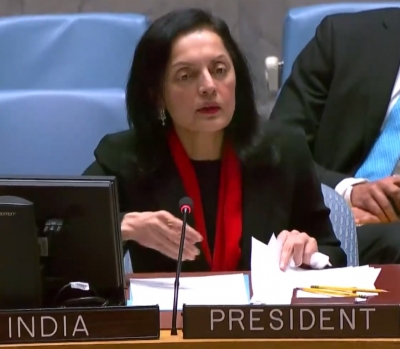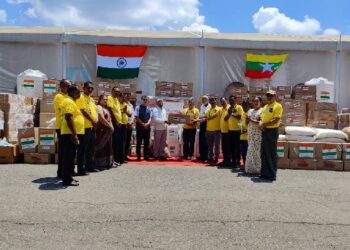India joined China and Russia in voting against a UN Security Council resolution calling for the restoration of democracy in Myanmar and the release of political prisoners, including Aung San Suu Kyi.
The long-awaited resolution was approved by the other 12 countries in the 15-member body on Wednesday, 22 months after Myanmar’s democratically elected government was deposed.
It was proposed by Britain, which has responsibility for Myanmar in the Council, following lengthy discussions for a consensus, which it did not achieve but softened to avoid vetoes from Russia and China.
Ruchira Kamboj, India’s Permanent Representative to the United Nations, called for the release of political prisoners and the restoration of democracy, but said the resolution will not help achieve those goals.
The resolution may “entrench the parties in their inflexible positions rather than encourage them to pursue an inclusive dialogue,” she explained, explaining India’s decision to abstain.
Myanmar’s complicated situation necessitates “quiet and patient diplomacy,” she added.
She emphasized that Myanmar’s stability has a direct impact on India’s national security, which shares a 1,700-kilometer border with it.
According to Kamboj, the welfare of the people of Myanmar is of “utmost priority” and is at the “heart of our efforts” there.
The Council had not passed any resolutions on Myanmar’s long periods of military rule, beginning with the first coup in 1962, until Wednesday, and recent efforts were met with threats of Russian and Chinese vetoes.
The military junta known as the Tatmadaw is not represented at the United Nations because the General Assembly’s accreditation committee has allowed representatives of Myanmar’s democratically elected government led by State Counsellor Aung San Suu Kyi to remain in office.
The resolution also called for the “immediate and concrete implementation” of ASEAN’s five-point consensus, as well as respect for human rights and accountability for those who violate them, as well as unhindered humanitarian access to those in need.
The April ASEAN plan also included mediation by its President’s representative and a visit by a special envoy to meet with all parties.
“Today we have sent a firm message to the military, that they should be in no doubt: we expect this resolution to be fully implemented,” said Britain’s Permanent Representative Barbara Woodward.
“It also sends a clear message to the people of Myanmar that the UN supports their rights, wishes, and interests,” she added.
According to US Permanent Representative Linda Thomas-Greenfield, the continuation of the military regime poses a threat to regional peace and security.
“Beyond the tremendous suffering in Burma, the brutality of the military regime continues to contribute to regional instability and a growing refugee crisis, having a direct and detrimental impact on regional peace and security,” she added.
According to Russia’s Permanent Representative Vasily Nebenzia, the situation in Myanmar is not a threat to international peace, which is the Council’s purview, but the resolution deals with human rights, which should be addressed by the appropriate General Assembly committee.
He went on to say that the issue of human rights was becoming politicized.
According to China’s Permanent Representative, Zhang Jun, the resolution violated Myanmar’s territorial integrity, and it was critical to promote talks and allow ASEAN to deal with the country.
Source:IANS







 Finance
Finance







